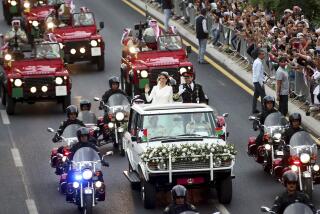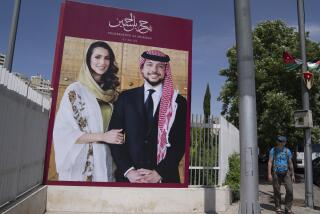King Hassan II of Morocco Dies at 70
- Share via
CAIRO — King Hassan II of Morocco, who ascended the throne as a playboy prince yet matured into one of the Arab world’s most respected statesmen and a strong voice for moderation in the Middle East during a 38-year reign, died Friday after several months of poor health.
The monarch had turned 70 two weeks ago.
After the death of King Hussein of Jordan in February, Hassan was the longest-ruling Arab sovereign, and his death marked another stage in the handoff of power to a new generation in the region.
Crown Prince Sidi Mohammed, 36, assumed the throne of the North African country of 29 million people hours after his father’s death.
“My father, His Majesty King Hassan, may God bless his soul, died of a heart attack at 4:30 p.m. due to complications that could not be treated,” the crown prince said in a short televised address announcing the death.
The king had been hospitalized earlier in the day in Rabat, the Moroccan capital, for what the palace had called in a statement “the appearance of an acute pneumonia.”
Former Israeli Prime Minister Shimon Peres, who met with Hassan at one of his palaces in a 1986 visit that shocked the Arab world, said: “He was a real friend of the Jewish people. He hoped for peace, he dreamed of peace, and he fought for peace.”
President Clinton offered his condolences by telephone, saying in a statement: “The Middle East has lost one of its greatest peacemakers. He worked to break down barriers among the peoples of the Middle East, bravely opening a dialogue with Israel . . . seeking greater tolerance and stability in the region.”
The president and First Lady Hillary Rodham Clinton will attend the king’s funeral Sunday, White House Press Secretary Joe Lockhart said.
Despite his high standing in Washington, the king riled the Reagan administration and Congress in 1984 by his surprise signing of a “unity” treaty with Libya, at a time when Libyan leader Moammar Kadafi was near the top of the U.S. pariahs list.
The treaty had more to do with local than global politics. Hassan wanted Libya to stop backing the Polisario Front guerrillas fighting for the independence of Western Sahara. A vague “unity” pact was the easiest way to cozy up to the Libyan leader, and nothing further ever came of it.
When then-Prince Hassan became king in 1961, his reputation as a jet-setting playboy had preceded him. He flew his own airplane, raced cars and horses, frequented nightclubs with beautiful women and reportedly spent more time worrying about his wardrobe than about his royal duties.
His father, Mohammed V, had died suddenly after minor surgery, and skeptics and supporters alike predicted that the 32-year-old bachelor would last no more than a few months as king. Even his first name, Moulay, which signifies direct descent from the prophet Muhammad, seemed a sacrilege to Morocco’s devout Muslims. But the new king moved quickly to reassure his subjects.
“The man you knew as Prince Moulay Hassan no longer exists,” he announced, and, through nearly four decades of unquestioned leadership, those words never returned to haunt him.
Hassan, a man known for his wit and charm, transformed himself into one of the Arab world’s most polished rulers. He was an adroit political manipulator who could capitalize on adversity. As a Western diplomat put it, “Even when he was wrong, he ended up being right.”
In 1971, mutinous army officers sent 1,400 cadets storming through the royal palace where 400 guests were celebrating the king’s birthday. Hassan escaped unharmed, although 100 people were killed in the wild shooting. He took refuge in his nearby apartment and reemerged three hours later, accompanied by a sergeant and several other soldiers.
“Long live Hassan II!” shouted the troops who remained on the palace grounds, and the revolt collapsed.
But Hassan’s most persistent liability was Morocco’s sputtering economy, not its 170,000-strong army. According to recent statistics, the per capita income in the country is $3,000 a year. Unemployment is widespread, and the literacy rate is only 50%.
Against this backdrop, Hassan’s lifestyle was regal. He let the weather and his sinus problems dictate which of his palaces he and his staff of 5,000 would occupy at any given time. He owned large tracts of farmland, formerly the property of French colonialists, and had extensive real estate holdings in Casablanca and Rabat. The marriage of his daughter, Lalla Mariam, in Fez in 1984 had all the trappings of a Hollywood spectacle.
But no one ever questioned Hassan’s right to rule. He was the 17th in a line of Alawite Muslims who had governed Morocco since 1649. As the prophet Muhammad’s descendant, he was his country’s spiritual head. He prayed daily, and as king did nothing to indicate that he was anything less than a pious Muslim.
Moulay Hassan was born July 9, 1929, in Rabat, the oldest of six children of Sultan Sidi Mohammed ben Youssef, whom the French colonial powers allowed to rule in local and religious matters while they retained overall control. He was educated in Morocco, studying law at France’s University of Bordeaux colonial extension school, and served briefly as a training officer on the French battleship Jeanne d’Arc.
In 1953, Sultan Mohammed and his family, including Prince Hassan, were exiled by the French to Corsica, and then Madagascar, to defuse an independence movement. But terrorism and rioting against the French increased, and in 1955 the royal family was allowed to return home. The prince, then 26, took part in the negotiations in Paris that led to Morocco’s independence March 2, 1956.
When Hassan succeeded his father, he continued to pursue Morocco’s moderate, pro-Western course. He grew increasingly close to the United States and shared President Reagan’s view that the Soviet Union was a destabilizing influence on world affairs. Many political analysts considered Hassan the West’s most reliable friend in the Arab world.
“His heart is in the East, but his mind is in the West,” a European diplomat in Rabat once said. “You can talk to this man in the same way you would talk to a European head of state or an American president. His sophistication goes far beyond what you normally find in the Middle East.”
During the 1991 Persian Gulf War, Hassan won plaudits from the West for his willingness to dispatch a symbolic contingent of Moroccan soldiers to fight on the side of the allies against Iraq. He also joined a summit conference in the Egyptian city of Sharm el Sheik in 1996 at the behest of the United States to condemn terrorist attacks against Israel.
But like those of other Arab leaders, his relations with the Jewish state chilled considerably during the just-ended premiership of Benjamin Netanyahu. As chairman of the Al Quds (Jerusalem) Committee of the Organization of the Islamic Conference, Hassan was outspoken in his insistence that the Palestinians be allowed to form the capital of their future state in Jerusalem.
Although Hassan had succeeded in uniting his country, an ancient kingdom the size of Oregon and Washington combined, he continued to be bedeviled by Morocco’s territorial claims to the Western Sahara, a former Spanish territory, where his soldiers could never quite defeat the Algerian-backed Polisario Front independence movement.
In 1975, to press his claims, Hassan sent 350,000 unarmed Moroccans on a march to Western Sahara. The Spanish soldiers watched in disbelief. Having made his point, the king ordered the civilians to return home, and the next year Spain pulled out of the phosphate-rich colony, ceding the northern two-thirds to Morocco and the southern third to Mauritania. But with Spain’s departure, the Polisario Front grew bolder.
Virtually every Moroccan supported the king’s contention that Western Sahara was Moroccan. To keep the Polisario guerrillas out of the population centers and phosphate-producing areas, Hassan built a 10-foot-high sand wall that extended more than 300 miles and was laced with mines and electronic sensing devices.
Derided at first as “Hassan’s Folly,” the wall proved to be a success and reduced the effectiveness of the guerrillas. A cease-fire has been in effect since 1991, with plans afoot for a U.N.-supervised referendum next year to determine the status of the territory.
Domestically, Hassan ran a relatively democratic government with a free-market economy. He once contrasted his economic policies with those of Algeria and Egypt, saying: “They want to impoverish the rich. We prefer to enrich the poor.”
In his later years, there was concern that the Islamist extremist violence that was tearing apart neighboring Algeria might find its way into Moroccan society. But Hassan artfully kept a balance--sometimes wooing and sometimes cracking down--to keep the threat of Islamist extremism at bay.
Hassan married Lalla Latifa shortly after ascending the throne. Princess Lalla was born in August 1962, and the next year, in May, Prince Sidi Mohammed, the heir apparent and the first of the king’s two sons, was born.
*
Lamb was formerly The Times’ bureau chief in Cairo. Daniszewski reported from Cairo.
More to Read
Sign up for Essential California
The most important California stories and recommendations in your inbox every morning.
You may occasionally receive promotional content from the Los Angeles Times.












